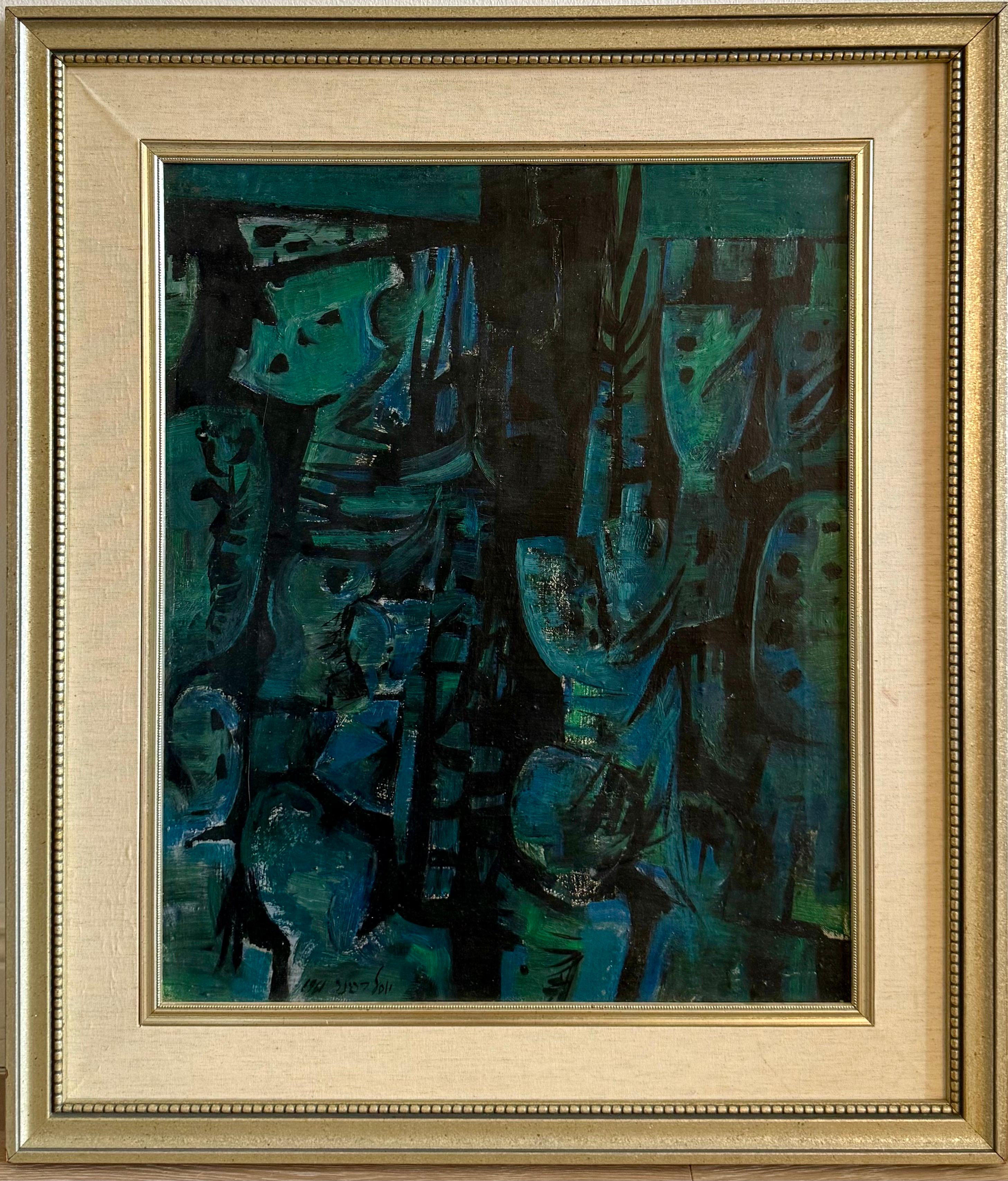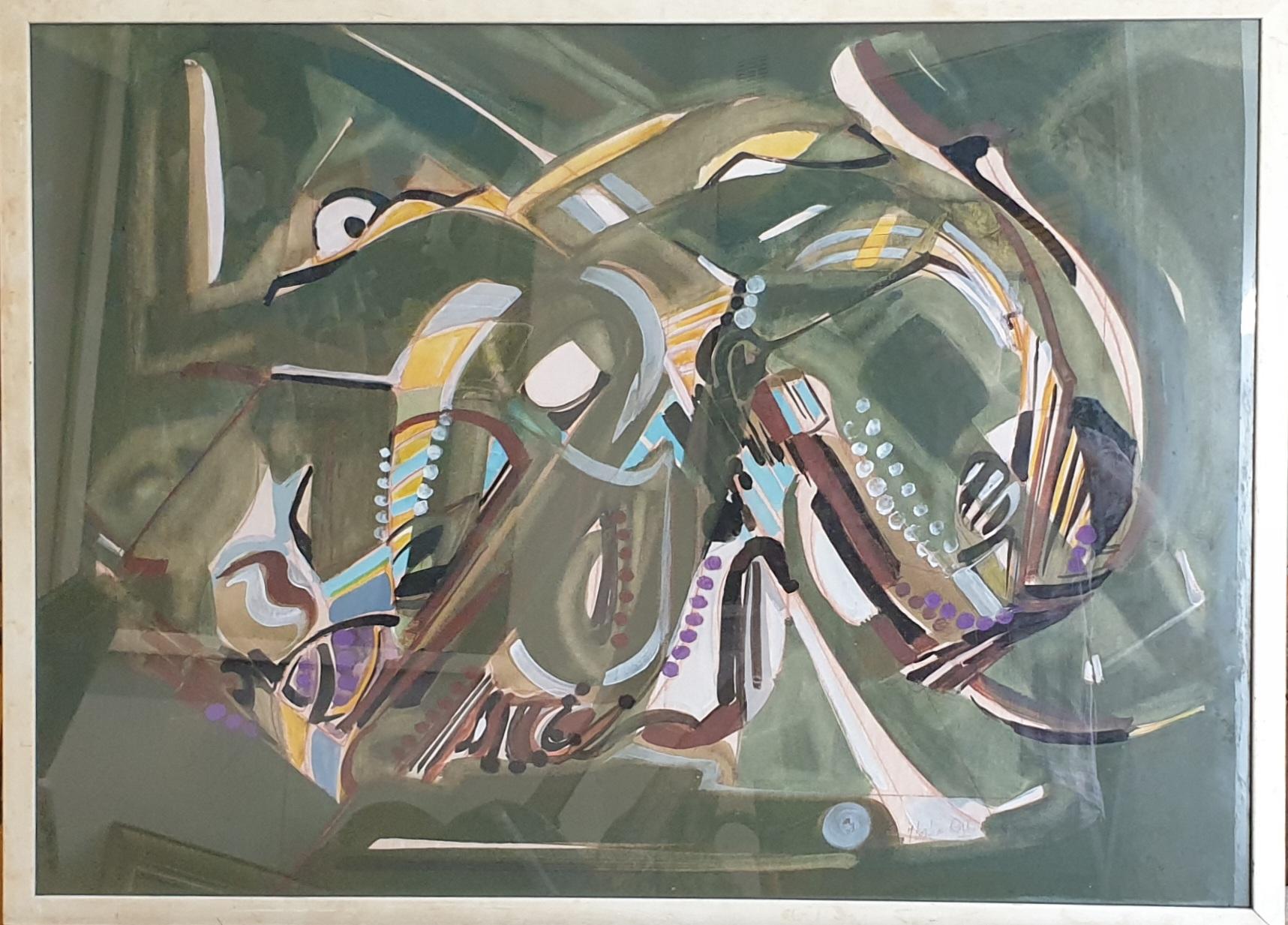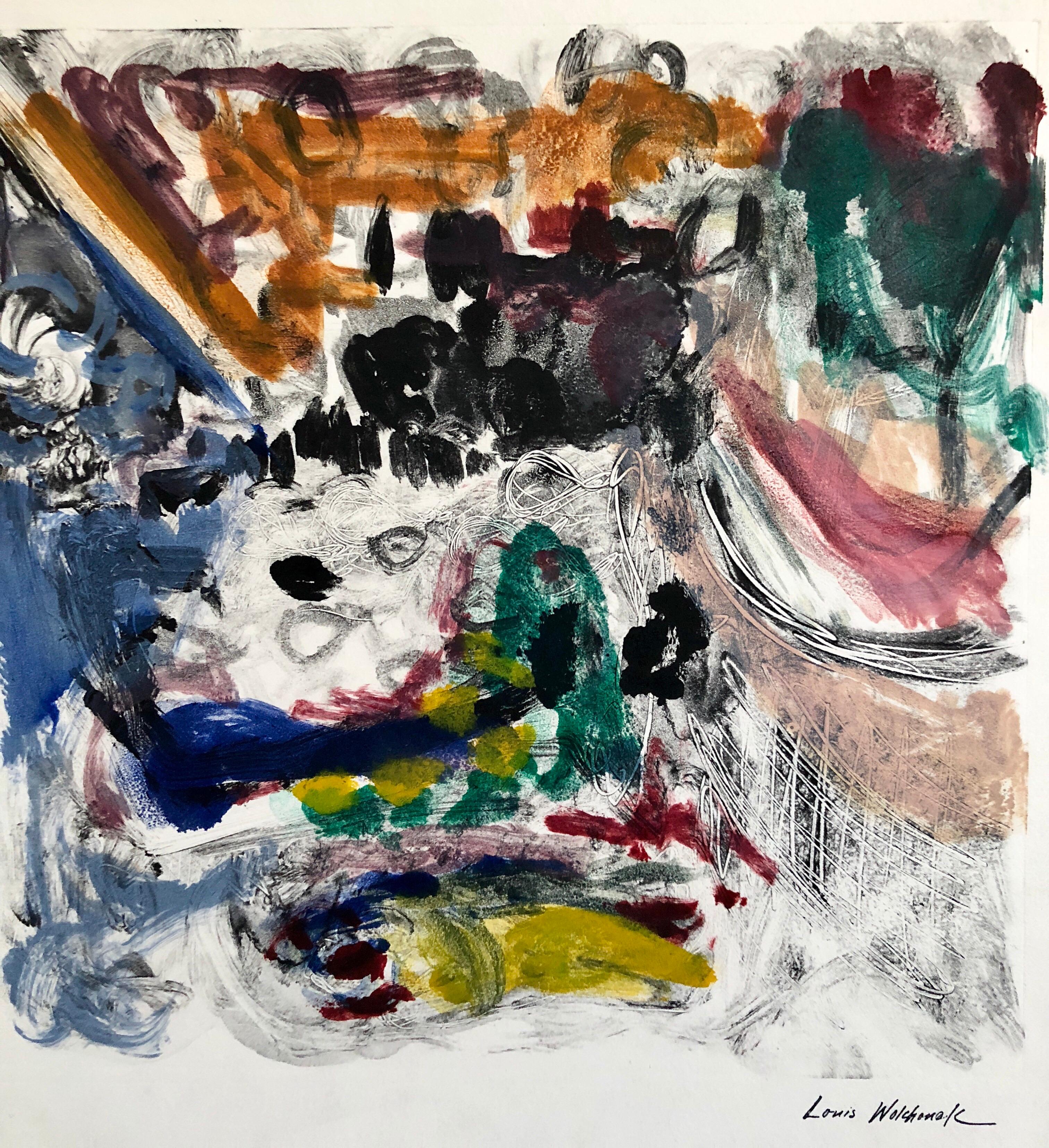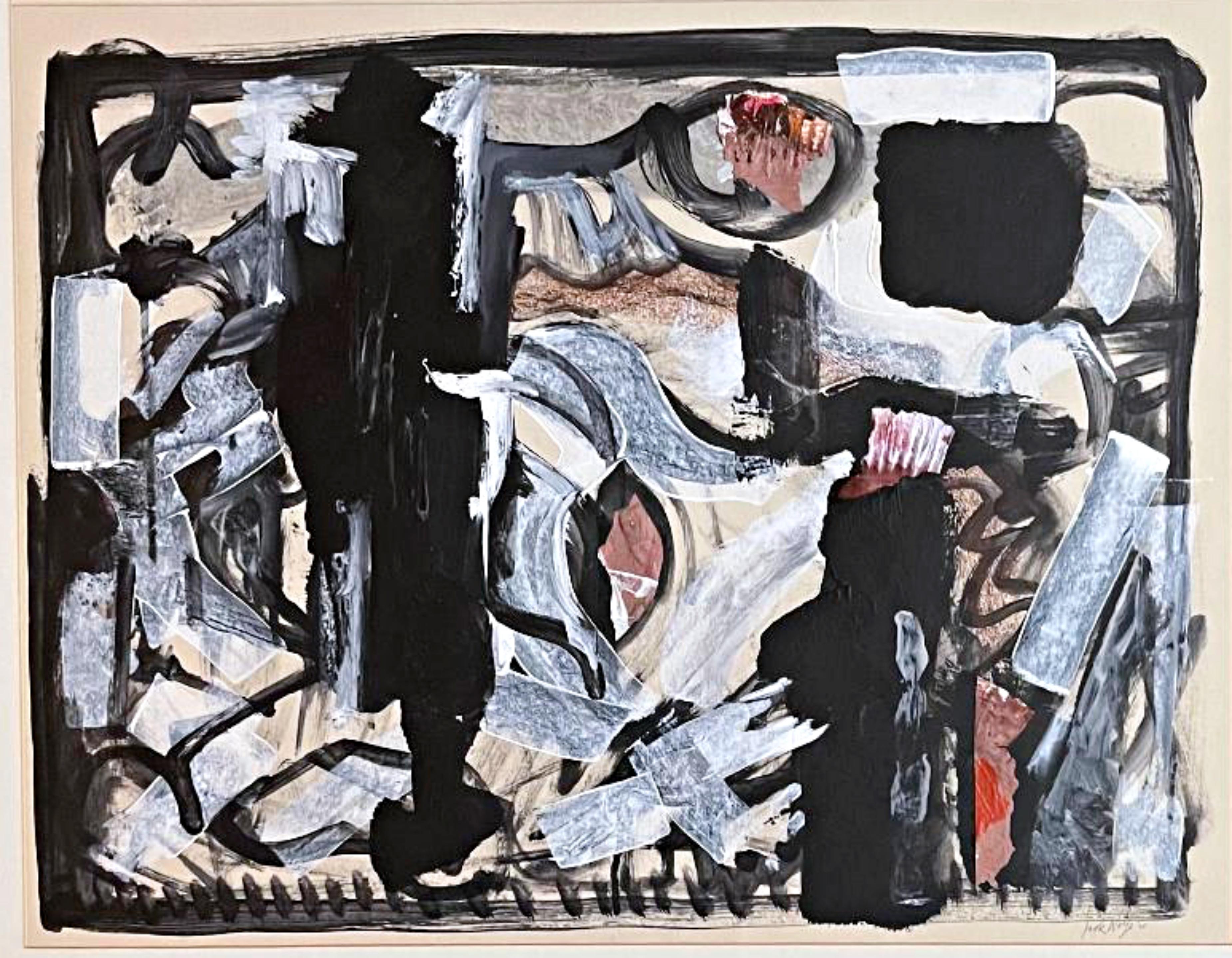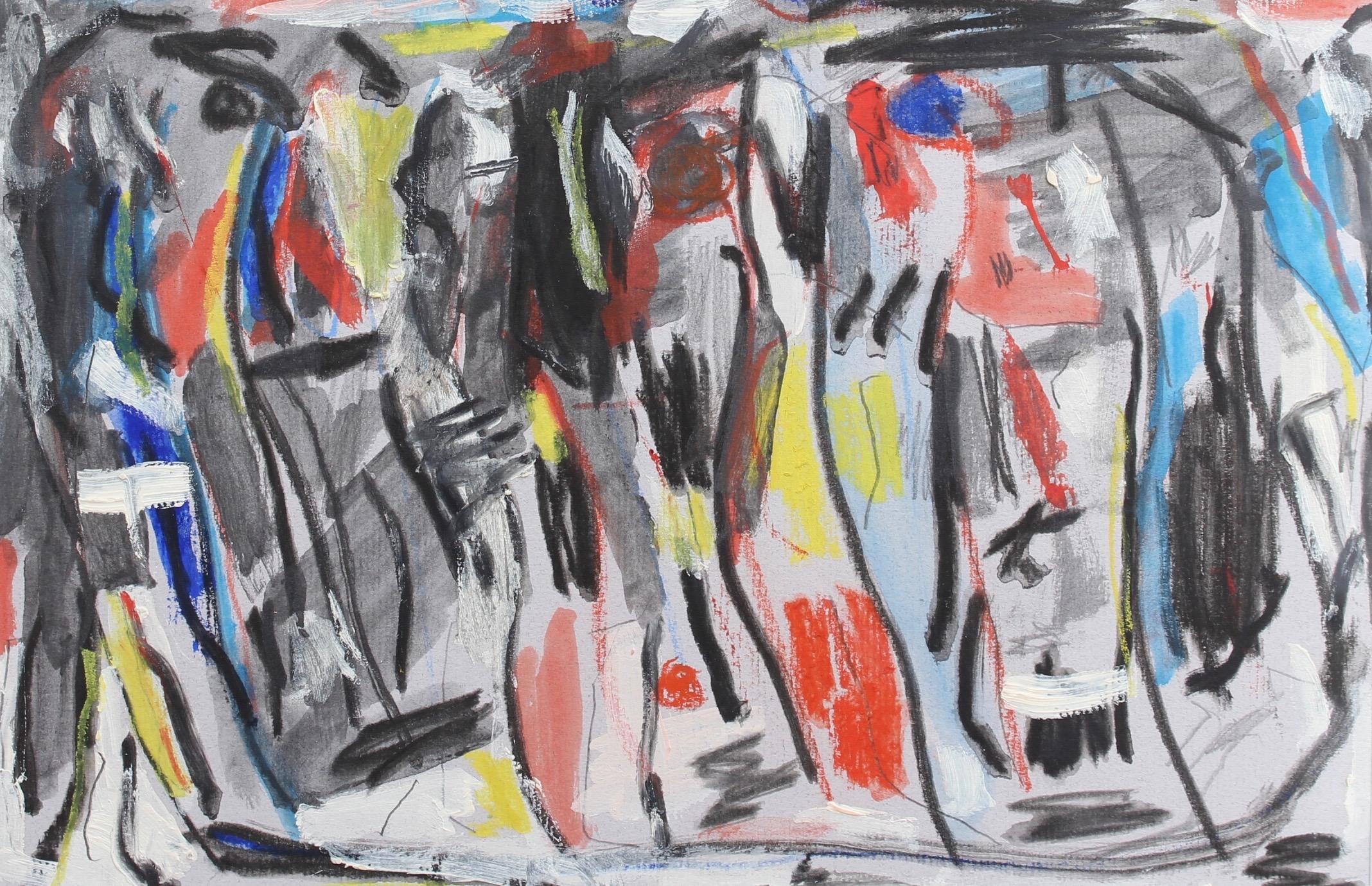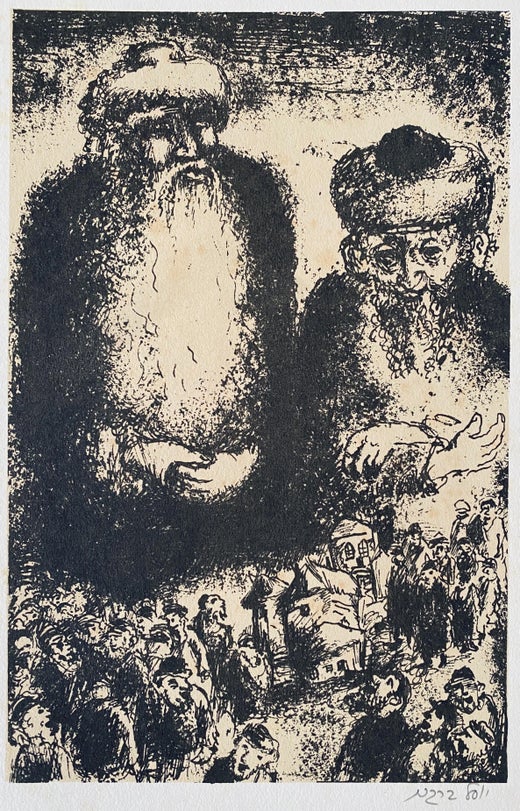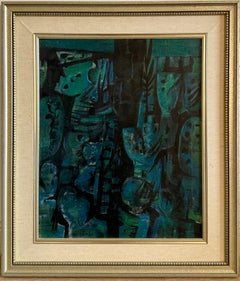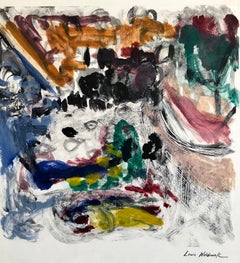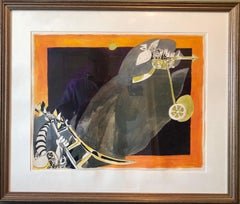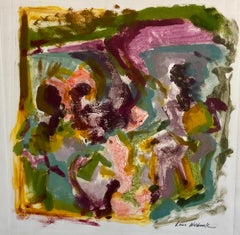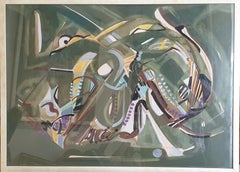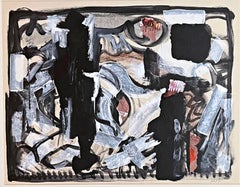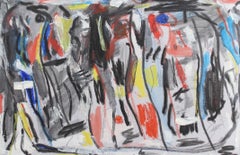Items Similar to Rare Israeli Modernist Figurative Abstract Gouache Painting
Want more images or videos?
Request additional images or videos from the seller
1 of 9
Yosl BergnerRare Israeli Modernist Figurative Abstract Gouache Painting
$1,800
£1,362.32
€1,563.55
CA$2,564.25
A$2,780.99
CHF 1,460.68
MX$33,779.83
NOK 18,278.11
SEK 17,209.87
DKK 11,677.96
About the Item
Mixed Media, Watercolor and Gouache
Bergner, Yosl (Vladimir Jossif) (b Vienna, 13 Oct 1920). surrealist, surrealism. belongs to the generation of people uprooted from childhood landscapes and forced by circumstance to build a life elsewhere. Uniquely, he became an Israeli without shedding his Jewish cosmopolitan-refugee identity, an identity he zealously guarded in the melting pot of Israel of the "fifties" and "sixties". In the years that have passed since he acquired his art education at the Melbourne National Gallery Art School in Australia, concepts in the art world have changed many times over. from the Jewish paintings and the depictions of Australian Aborigines through the children of safed, the wall paintings, the masks, the angels and kings, the still lifes, the "Surrealistic" paintings, the toys and flowers, the paintings inspired by the Bird-head Haggada, the Kafka paintings, the Pioneers, the Kimberley fantasy (about his father's excursion in 1933 to northern Australia, in search of a "territory for the Jews"), Brighton Beach and the seascapes inspired by Eugene Boudin, through the chairs in the "Kings of Nissim Aloni" episode to the "Zionists" and the recent "Tahies". "During the six years that Bergner has lived in Israel," wrote Eugene KoIb, Direct. or of the Tel Aviv Museum, in the catalog of the Bergner exhibit in 1957, "he has established himself among Israeli artists." Bergner was indeed one of the artists who represented Israel in the Venice Biennial (1956; 1958) and in the Sao Paulo Biennial in 1957; this, in spite of the fact that Yosl Bergner did not harness his art to serve the Zionist ethos, that being, at the time, the order of the day (his paintings were in fact rejected at first as being those of a "Diaspora Jew"); he didn't "naturalize" himself by alliance to the country's landscape or its special light, nor did he turn to abstract painting. Painter of "the Jewish condition". the painter involved in Nissim Aloni's theater and the popular illustrator of poetry books and literary texts, he stuck to the narrative which drew its images from his childhood world, from Yiddish and from the Jewish culture of Poland in whose bosom he grew, with its literature, theater and fantasy. From this point of view his position as an "outsider", first in Australia and later in Israel, like that of the European Jew on the periphery of the dominant culture, afforded him a special dialectic vantage point from which to view his human and cultural surroundings. He was and remains a figurative painter even when he verges on the abstract. Israeli painter of Austrian birth, active in Australia. He grew up in Warsaw. His father, the pseudonymous Jewish writer Melech Ravitch, owned books on German Expressionism, which were an early influence. Conscious of rising anti-Semitism in Poland, Ravitch visited Australia in 1934 and later arranged for his family to settle there. Bergner arrived in Melbourne in 1937. Poor, and with little English, his struggle to paint went hand-in-hand with a struggle to survive. In 1939 he attended the National Gallery of Victoria’s art school and came into contact with a group of young artists including Victor O’Connor (b 1918) and Noel Counihan, who were greatly influenced by Bergner’s haunting images of refugees, hard-pressed workers and the unemployed, for example The Pumpkin-eaters (c. 1940; Canberra, N.G.). Executed in an expressionist mode using a low-toned palette, they were among the first social realist pictures done in Australia. he has works in the Jewish Museum in New York, the Israel Museum in Jerusalem and in numerous others. 1980 Israel Prize with Anna Ticho. Exhibited in Australia in framework of 'Association of Contemporary Art'; participated in group, 'Social Realism'. Retrospective Exhibition: The Tel-Aviv Museum of Art April-August 2001. Prizes: Dizengoff Prize; Israel Prize. This came from an important collection that included works by Reuven Rubin, Nachum Gutman, Marcel Janco, Moshe Castel, Stematsky, Igael Tumarkin, Menashe Kadishman, Uri Lifshitz, Jacob Agam, Moshe Rosentalis, Lea Nikel and others.
- Creator:Yosl Bergner (1920 - 2017, Israeli)
- Dimensions:Height: 19.5 in (49.53 cm)Width: 25.25 in (64.14 cm)
- Medium:
- Movement & Style:
- Period:
- Condition:minor wear.
- Gallery Location:Surfside, FL
- Reference Number:1stDibs: LU38210968802
Yosl Bergner
Yosl Bergner was an Israeli painter who was born in Vienna in 1920 and grew up in Warsaw. With rampant anti-Semitism in Europe, the Freeland League for Jewish Territorial Colonization was formed in July 1935 to search for a potential Jewish homeland. Soon afterwards a pastoral firm offered the League about 16,500 square kilometers in the Kimberleys, stretching from the north of Western Australia into the Northern Territory. As history showed, the plans went nowhere. But for a time, the Australian idea was at least worth considering. Bergner's father, Melech Ravitch, became involved in a serious investigation of the Kimberleys. Thus the Bergner family moved to Australia. Yosl emigrated to Australia in 1937 and studied in the National Gallery School until the outbreak of War World II. He served for four and a half years in the Australian Army, and later continued his studies at the Art School. In Melbourne from 1937-48, Bergner befriended many of the local artists who now epitomize modern Australian art: Sidney Nolan, Albert Tucker, John Perceval and Arthur Boyd. Adrian Lawlor moved with his wife to a cottage at Warrandyte where they lived for 30 years. Bergner was a frequent visitor at this Warrandyte home. All the men socialized together. Bergner encouraged them to go beyond their traditional landscape style, and he introduced a more radical concern for working families, thus having an important impact on Australian art. Bergner may not have been prepared for the plight of many struggling Australians. Yet he felt a strong connection between the suffering of people everywhere, whether they were the Jews that he remembered from Europe, landless blacks in the heart of Australia or hungry children in inner urban Melbourne.
He left Australia in 1948 and after two years of traveling and exhibiting in Paris, Montreal and New York, he settled in Israel. He lived in Safed until moving to Tel Aviv in 1957. Bergner has designed scenery and costumes for the Yiddish and Hebrew Theatres, particularly for the plays of Nissim Aloni, and has illustrated many books. The acme of Bergner's paintings is his allegorical works; he uses kitchen tools such as squashed pots, oil lamps, wrecks and cracked jugs, and he anthropomorphizes them. These old instruments symbolize distorted and poor world of wars, secrets and darkness.
About the Seller
4.9
Platinum Seller
Premium sellers with a 4.7+ rating and 24-hour response times
Established in 1995
1stDibs seller since 2014
1,812 sales on 1stDibs
Typical response time: 1 hour
- ShippingRetrieving quote...Shipping from: Surfside, FL
- Return Policy
Authenticity Guarantee
In the unlikely event there’s an issue with an item’s authenticity, contact us within 1 year for a full refund. DetailsMoney-Back Guarantee
If your item is not as described, is damaged in transit, or does not arrive, contact us within 7 days for a full refund. Details24-Hour Cancellation
You have a 24-hour grace period in which to reconsider your purchase, with no questions asked.Vetted Professional Sellers
Our world-class sellers must adhere to strict standards for service and quality, maintaining the integrity of our listings.Price-Match Guarantee
If you find that a seller listed the same item for a lower price elsewhere, we’ll match it.Trusted Global Delivery
Our best-in-class carrier network provides specialized shipping options worldwide, including custom delivery.More From This Seller
View AllIsraeli Expressionist Oil Painting Yosl Bergner Modernist Abstract Composition
By Yosl Bergner
Located in Surfside, FL
Yosl Bergner (Israeli 1920-2017)
Untitled, 1961
Oil on canvas
Dimensions: 19 5/8 x 24 3/8 in. Framed, 32.25 x 28 inches
Hand signed in Hebrew and dated lower left
Bears gallery stamp...
Category
1960s Modern Figurative Prints
Materials
Canvas, Oil
Abstract Expressionist Oil Painting Modern Monoprint WPA Jewish Artist
By Louis Wolchonok
Located in Surfside, FL
Louis Wolchonok was a social realist painter and member of the Woodstock Art Association. His work was exhibited at the Whitney Museum of American Art, the National Academy of Design...
Category
20th Century Modern Abstract Paintings
Materials
Paper, Oil
Rare German Israeli Surrealist Judaica Abstract Gouache Watercolor Painting
By Naftali Bezem
Located in Surfside, FL
A Surrealist Judaica scene of a bearded man (Rabbi) in a boat with Shabbat candlesticks.
Sight size: 17.75" x 22.5". Overall size with frame: 26.5" x31.5"
Naftali Bezem (Hebrew: נ...
Category
1970s Modern Abstract Paintings
Materials
Ink, Watercolor, Gouache
Abstract Expressionist Oil Painting Modern Pastel Monoprint WPA Jewish Artist
By Louis Wolchonok
Located in Surfside, FL
Louis Wolchonok was a social realist painter and member of the Woodstock Art Association. His work was exhibited at the Whitney Museum of American Art, the National Academy of Design...
Category
20th Century Modern Abstract Paintings
Materials
Paper, Oil
Abstract Composition with Figures Israeli Mid Century Modernist
By Stefan Alexander
Located in Surfside, FL
Stefan Alexander, born Czechoslovakia. In World War II sent to forced labour camps. 1945-49 Member of Czech Academy of Arts. 1952 Settled in Safed and participated in permanent exhib...
Category
Mid-20th Century Abstract Paintings
Materials
Gouache, Pen
Israeli Motke Blum Modernist Abstract Expressionist Oil Painting Bezalel Artist
By Motke Blum
Located in Surfside, FL
Motke Blum was born in Racacun, Romania in 1925. Early in his childhood, the Blum family moved to Bucharest where they settled in a house situated near a circus. The circus would become young Blum's greatest love. He befriended several of the clowns and other performers and, when not painting or playing in clay, Blum could be found enjoying the company of these spirited entertainers. These experiences would later become a recurring theme in many of his works of art.
In 1938, he was taken by the Romanian Iron Guard. When the Germans invaded Romania, Blum was taken to a forced labor camp. Even during his imprisonment, he continued to create art, painting on the walls of the camp. He escaped the Nazi camp in 1944 and boarded an immigrants' ship to Israel. One of the three ships in the convoy was sunk by a German torpedo. Motke later incorporated shipwrecks, boats, and other maritime subjects into several of his paintings.
Studies, Bezalel, Jerusalem, Enamel, Silversmithing, Painting and Sculpture.
1956 Seminar in the dep. of design in the royal silver factory of Zeist, The Netherlands.
Over the course of his long and fruitful career, Blum showed internationally at over fifty one-man-shows with exhibits in Israel, Holland, England, Belgium, the United States, France, Australia, and more. His art has been commissioned for public buildings and by prominent figures in Israel and around the world, and a series of posters were commissioned by the Justice Ministry and the Ministry of Tourism.
Group exhibition
Rina Gallery, Jerusalem
Artists: Motke Blum, Efraim Fima (Roytenberg, Ephraim) Zelig Segal, David Sharir, Joseph Halevi...
Category
20th Century Modern Abstract Paintings
Materials
Mixed Media, Oil, Illustration Board
You May Also Like
Late 20th Century Abstract Expressionist Gouache on Paper.
Located in Cotignac, FR
Lyrical abstract expressionist gouache on paper by French artist Michel Loiseau. Signed bottom right.
Michel Loiseau-Rizzo, born in 1937 is an illust...
Category
Late 20th Century Abstract Expressionist Abstract Paintings
Materials
Paper, Gouache
$881 Sale Price
54% Off
Mid-Century Modern Abstract Expressionist Still Life Oil Painting
By Toma Yovanovich
Located in Buffalo, NY
An original mid century modern abstract expressionist painting by American artist Toma Yovanovich.
Toma Yovanovich (1931-2016)
Yovanovich was a painter/printmaker whose work i...
Category
1960s Abstract Expressionist Abstract Paintings
Materials
Illustration Board, Oil
$720 Sale Price
20% Off
Mid century Modern 1960s Abstract Expressionist painting, renowned artist Signed
Located in New York, NY
Jack Wolfe
Untitled, 1965
Acrylic and collage on board
Hand signed on the front
Frame included: held in original vintage frame with original gallery label
Unique
Provenance: Parker Street 470 Gallery, Boston, Mass (with label verso)
Excellent abstract expressionist mixed media work.
Measurements:
Image:
17" x 24"
Framed:
24" x 28" x 1"
From Wiki:
Jack Wolfe (14 January 1924 – 18 November 2007) was a 20th-century American painter most known for his abstract art, portraiture, and political paintings. Jack Wolfe was born in Omaha, Nebraska on January 14, 1924, to Blanche and Everett L. Wolfe. Soon after his birth, his family moved to Brockton, MA. At 18, Wolfe had an interest in commercial illustration, which he pursued at the Rhode Island School of Design (RISD). However, upon matriculating at RISD in 1942, he developed an interest in fine art and painting inspired by an exhibition of modern French art. He described this change of direction, explaining that, "One day, for the first time, I saw an exhibition of modern French art. It was like being struck by lightning." He became particularly interested in the work of a number of European modernists, including Rouault, Cézanne, Braque, Modigliani, and Picasso.[1] Following his time at RISD, he pursued a Master’s in Fine Arts degree at the Museum of Fine Arts School in Boston, MA. At the Museum School, Wolfe studied under the renowned Expressionist Karl Zerbe, a German-born artist who was the Museum School's most influential and vital teacher until 1953.[2] After graduating from the Museum School, Wolfe was represented by the Margaret Brown Gallery in Boston, which also represented many other cutting edge Moderns that defied the more conservative tastes of New England collectors at the time, including György Kepes, Congur Metcalf, and Alexander Calder.[3]
Career and Museum Representation
Jack Wolfe's painting "Robin's Rock" 1962, 72" x 72"
Jack Wolfe's artwork received early recognition from a number of organizations and was consistently featured in influential exhibitions, including the 1955 Carnegie International at the Carnegie Institute in Pittsburgh, PA, the American Federation of Art's traveling exhibition New Talent in the USA in 1956-57, the Whitney Museum’s Young America exhibition in 1957,[4] the Boston Institute of Contemporary Art's Selection exhibition in 1957,[5] and both the Whitney Museum’s 1958 Annual exhibition and its Forty Artists Under Forty show in 1962-63.[6] In 1959, his widely acclaimed Portrait of Abraham Lincoln toured Europe in a show circulated by the Institute of Contemporary Art, Boston. In addition, his painting Crucifixion was chosen by the United States Information Agency to be exhibited across Europe, including being shown at the Salzburg Biennial in Austria in 1958.[7] Crucifixion was also exhibited at the Whitney Museum and subsequently displayed in the National Cathedral in Washington, DC, in 1958.[8] In 1966-67, his work was selected for Art for Embassies by the U.S. State Department.[9] He received the first annual Margaret Brown Memorial Award for high achievement by a New England Artist from the Institute of Contemporary Art, Boston, in 1958.[10]
With his future as one of the great artists of his time laid out neatly before him, Wolfe moved to New York in the early 1950s, which was then the postwar epicenter of the art world and in the midst of experiencing the first real revolution in American Art, now known as Abstract Expressionism.[11] However, almost immediately upon his arrival, he became disenfranchised with the overtly commercial nature of the art scene there, spurning fame and security in an unwillingness to bend his creative vision to the expectations of others.[12] After four short months, he left New York, returned to Massachusetts where he bought property in Stoughton, cleared the land, and built both his home and studio with his own two hands. He would go on to live and paint there, extensively exhibiting and garnering constant critical acclaim.[13]
Wolfe became one of the earliest artists championed by the deCordova Museum in Lincoln, MA and the Institute of Contemporary Art in Boston. He was awarded a traveling scholarship in 1958,[6] which allowed him to set up studio in San Miguel de Allende, Mexico and then in San Francisco, California.[14] Upon his return in 1959, the deCordova museum hosted Wolfe’s third solo exhibition, featuring work made during his time in California...
Category
1960s Abstract Expressionist Abstract Paintings
Materials
Mixed Media, Acrylic, Gouache, Permanent Marker
Untitled II
By Erez Yardeni
Located in London, GB
'Untitled II' abstract composition, mixed media on soft board, Japanese ink, oil, pencil and gouache by Erez Yardeni (2018). There is so much energy in th...
Category
2010s Abstract Abstract Drawings and Watercolors
Materials
Ink, Oil, Gouache, Board, Pencil
$2,749 Sale Price
50% Off
Large French 20th Century Painting Vibrant Bold Colours Dynamic Shapes Abstract
Located in Cirencester, Gloucestershire
Abstract Expressionist Composition
by Gilbert Pelissier (French born 1924)
signed, inscribed verso
oil painting on canvas, unframed
canvas size: 24 x 20 inches
condition: overall ver...
Category
Late 20th Century Abstract Expressionist Abstract Paintings
Materials
Canvas, Oil
Original, 1985 Abstract Figurative Painting
By Gisele Leclerc
Located in Los Angeles, CA
Richly colored, signed and dated, abstract figurative, acrylic-on-paper artwork by listed, Quebecois Expressionist painter, Gisele Leclerc (1931-2019). Her work appears in the presti...
Category
Vintage 1980s Canadian Contemporary Art
Materials
Acrylic, Paper
More Ways To Browse
Rare Paintings
German Early 20th Century Expressionist Painting
Jewish Paintings
Rare Art Paintings
Toys Painting
Rare Abstract Art
Pioneer Paintings
Israel Abstract Painting
Eugene Boudin
Vintage Art Melbourne
Avery Milton
1976 Paintings
24x24 Painting
De Nicola
Art In Houston
Georgia O Keeffe
Martin Luther King
Ukrainian Artists Paintings
